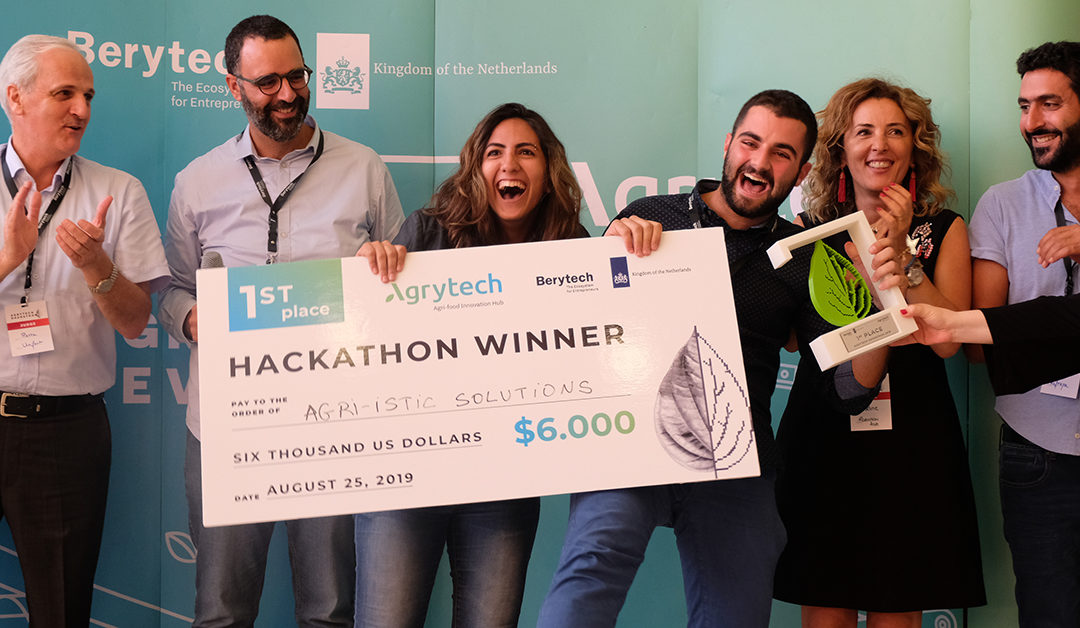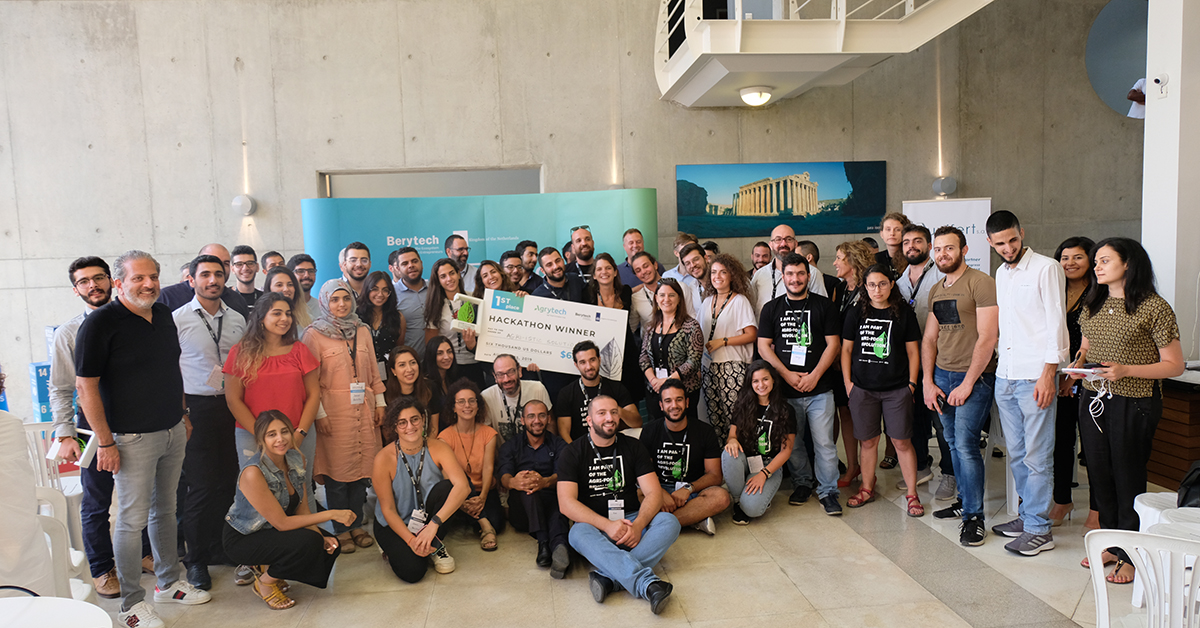Agri-istic solutions – a startup which aims to replace chemical weed control with a one-shot laser technology, won first place at the 2019 Agrytech Hackathon event this weekend organized by Berytech under the Agrytech program, and supported by the Embassy of the Kingdom of the Netherlands in Lebanon.
Innovating, Hacking and Winning
“Killing weeds using chemicals brings health and environmental hazards; even removing them mechanically burdens farmers with high crop losses and high costs,” co-founder Guadaluna Shah pitched to the judges during the hackathon. “As a solution to this problem, we are proposing to use laser technology – a simple one-time shot mechanism that can kill weeds with high accuracy. This solution still hasn’t grown fully into commercial use, and we can take advantage of existing laser tests and data sets to further develop them,” she explained.
Guadaluna and her co-founders Georgy Kassab and Fabio Bou Habib thanked the mentors for their support and encouragement. “The Agrytech Hackathon was an amazing experience. I learned how to do a lot of things during these 4 days, from designing a business plan, to implementing my idea to pitching it to the judges. It was a great learning curve,” Georgy said. Luna and Georgy, along with the first runner up Organy Clean, were qualified to join Batch 3 of the Agrytech accelerator program. They won the first prize of $6,000, divided into an immediate cash prize of $4,000 and a cash grant of $2,000 which they will receive to validate their solution during the first phase of the accelerator program.
Second prize winner Organy Clean won $4,000, divided into an immediate prize of $2,000 and the cash grant of $2,000 during the accelerator program. Organy Clean provides sustainable green cleaning products, such as agro-cleaning soaps made from agri-waste, which contains essential oils and vitamins, mixed with plant-based cleaning solutions. “These soaps can be used as a one-time hand soap,” co-founder Abed Al Rahman Serhan, who had a working prototype, pitched to the audience.
The third winner was Grapak, who won an immediate cash prize of $2,000. Grapak manufactures biodegradable and eco-friendly packaging films made of grape residue. “The manufacturing is a four-step process that includes collecting the residue, extracting the natural antioxidants, transforming it into powder and then finally adding the natural plasticizer to end up with a healthy cling film,” co-founder Karen Bou Doumit pitched.
Commenting on the Agrytech program, Berytech Chairman and CEO Maroun Chammas said, “The whole purpose of the program is to help solve national challenges, such as the loss of apple crops for example, a national problem that two of the shortlisted startups tackled.”
“Our role at Berytech is to help the teams that are here by advising them, by mentoring them, by helping them in validating their business model. This is our role: to help them grow and take their startup from the idea stage to a full-fledged business,” he added.
Teams and Judges
The judges this year included Ramy Boujawdeh – Deputy GM at Berytech, Carine Fersan – head of brand management at BLC Bank, Nadine Khoury – president of Qoot Cluster and COO at Robinson Agri, Pierre Njeim – specialty fertilizers line manager for MENA at UNIFERT, and Rani Azzi – Vineyard manager and assistant technical director at Kefraya as well as Vice President of Qoot Cluster.
21 teams participated in the hackathon. These teams then pitched to four judges on the third day and were shortlisted into the following 10 teams: Grapak, Food deals, Safer Agrifoods, Smart Weeding, Agri-istik Solutions, Point Solutions, Prae Cultiva, Storevest, Pomme-Chips, and Organy Clean.
The judges who shortlisted the teams included mentors Bart Doorneweert and Antoine Miltenburg from the Source Institute – an organization that develops peer learning to help solve humanity’s pressing challenges and which has partnered for the second year with Berytech. They were joined by Joanna Abi Abdallah – head of business support and development at Berytech and Bassel Basha, assistant line manager at UNIFERT. “We looked for teamwork, focus, execution power and drive,” Miltenburg told Berytech. “We also looked for people who could bond and learn from each other and collaborate with one another,” Doorneweert added.
All teams were encouraged to apply for the Agrytech accelerator program, even the ones who weren’t shortlisted. “We believe there are challenges in the agri-food sector and we believe that you have the power to change those realities and make a difference,” Ramy Boujawdeh told the audience, “and I would like to invite all of you to apply to the Agrytech accelerator.”
There were several mentors during the hackathon, including Lama Antonios – co-founder of Mushtic, who despite not winning the hackathon last year, still went on to graduate the Agrytech accelerator’s second batch and notably win the local semifinals of the 2019 Hult Prize.
“I remember Agrytech hackathon being the launching pad of Mushtic,” Antonios told Berytech. “It was a really tough experience but a very valuable one where we got to learn a lot of cool things concerning business and implementation. It was really worth it.” The other mentors included Doorneweert and Miltenburg, as well as members of the Berytech team.
“I think the hackathon is a nice opportunity to see how you function as a team and the flow of working together,” said Doorneweert. “By the end of the hackathon people either get a sense that they really have a good team and really wanna go for it, or they will think: ‘this was fun but we’re not quite ready yet’. Either way they make a decision after this weekend.”
The hackathon qualified 60 participants from 120 applicants. 21 teams were formed and there were more than 33 volunteers and mentors, 21 challenges, more than 30 partners and six teams who adopted the suggested challenges.
The Hackathon Agenda and Activities
The initial participants of the hackathon went on a fieldtrip on Thursday 22 August to visit Lebanon’s major players in the agri-food and deforestation sectors. These included the NGO Arcenciel, Souk el Khodra in Qab Elias, Bekaa, the apiary of Johnny Bou Rjeily shadowed by Dani Obeid, the Lebanese Reforestation Initiative (LRI), Chateau Kefraya winery and the fertile village of Ammiq in the Bekaa Valley.
Through this visit, the participants discovered first-hand the eminent challenges facing the agri-food sector in the four challenge areas: farming, post-harvest, processing and manufacturing, or marketplace.
“The participants were able to ask a lot of questions and get an insight on how farming, post harvesting and processing work,” said agribusiness expert and developer Miltenburg, who, along with Doorenweert, oversaw the trip. “The purpose was also for team members to meet and bond with one another so they could potentially team up the next day.”
Participants were also able to use the Berytech Fabrication Lab to create their prototypes. The lab has the latest digital manufacturing technology and a wide range of machinery and equipment to develop hardware, electronics and other elements.
The Agrytech Hackathon was supported generously by Unifert and Robinson Agri, as well as Waterlution.


